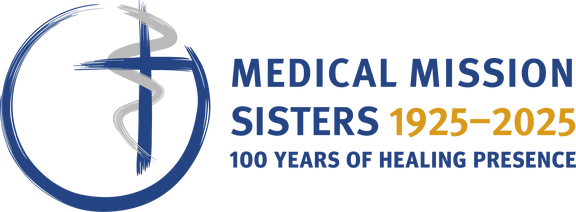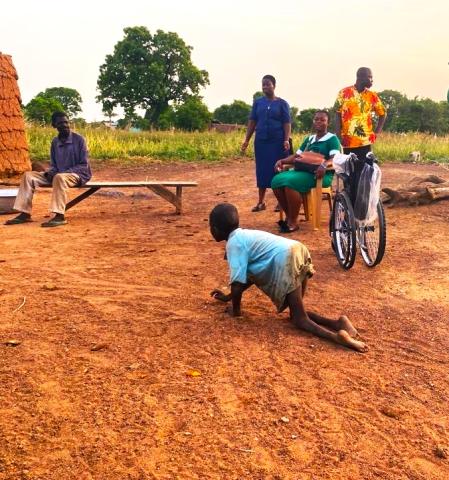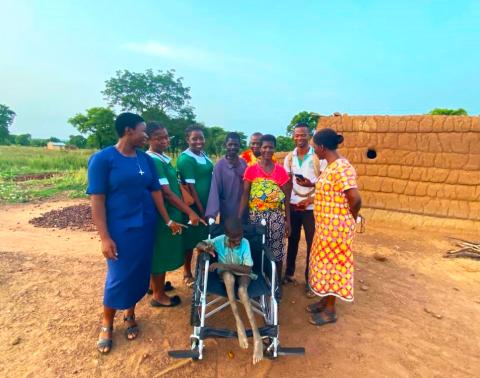Austrian Delegation Visits Us in Kulmasa in Northern Ghana
MMS’ integrated healthcare programme in Kulmasa, Northern Ghana, is fast developing on different fronts. Earlier in the month, Sister Rita Amponsaa-Owusu, who is leading this activity, welcomed a visiting delegation from Jugend Eine Welt (Youth for One World or J1W), MMS Unit West Africa’s partner organisation, based in Vienna, Austria. This included CEO, Reinhard Heiserer, fundraisers and a journalist from Austrian TV who accompanied them.
Soon after arrival, there was an opportunity for everyone to sit down together in the newly constructed office block, where its first ever meeting took place. Particular gratitude goes to our donor, Stichting Vrienden Medische Missiezusters, based in The Netherlands (usually known as ‘Vrienden’) for enabling us to build it. During this meeting, the members of MMS’ newly recruited public health team introduced what they are doing in the 54 villages which surround Kulmasa. The team now comprises: a Medical Officer; a Physician’s Assistant; two Midwives; three Nurse Assistants (notably, two Community Health Nurses and one Clinical Assistant); a Nutrition Officer; a Disease Control Officer; and a Translator who doubles up as a Driver. This makes eleven members in total including Sister Rita.
The following day, J1W first met with the local Chief and Elders. As custom demands, the sisters often bring ‘cola’ to the local palace, usually in the form of money. On this particular day, after they had given the traditional cola, the Chief and Elders told the sisters that they have now ‘become Kulmasa citizens’ and this gesture is no longer necessary. It meant such a lot to them to hear these words. The visitors from J1W were then invited to join in medical visits to the villages, many accessible only by foot or on a motorbike.
Their first stop was at Kulmasa’s Community-Based Health Planning and Systems compound (CHPS), the only health centre in the area. It offers the lowest level of healthcare in the country, being very under-resourced in terms of the staffing, pharmaceuticals and equipment needed to deliver quality clinical care. At this level of healthcare, a medical doctor will never be posted to the site and the facility has no physician's assistant either. It does not meet even the most basic health needs of the local communities. Sometimes crucial medicines, like paracetamol, suppositories for children and antimalarials, are not available for long periods of time. Accompanying MMS’ public health team on their visit to the villages proved quite an adventure, when everyone had to cross a wide stream which, Sister Rita explained, means that some of the villages get completely cut off during the rainy season. This particular visit - to a mobile clinic - was timed to happen before the rains peak and, as a result, the clinic was bursting at the seams. Local people came with their many different healthcare needs and concerns, to be addressed patiently, one-by-one, by the team’s members who took their time to treat each of them. However, the following day’s mobile clinic, which is scheduled on two consecutive days in every month, proved to be even more crowded. Serving the biggest local community in the area, the Austrian journalist captured a most impressive turnout for his future viewing audience in Austria - showing the scale of neglected health needs in this impoverished region.
Finally, Sister Rita took her visitors to meet some of the local children with disabilities in and around Kulmasa. In this underserved region of Northern Ghana, disability still attracts stigma and discrimination, which is why many families choose to keep their disabled children hidden from view. It is taking time and trust to reach them with assistance. First, the Austrian visitors met someone whom we’ll call T. Now in her twenties, when T. started to show symptoms of mental health problems at the age of six, her family kept her chained with the pigs in their pigsty where she began to grunt like they do - until the public health team arrived. The Medical Officer insisted that T. was bathed and given a clean space of her own, away from the pigs, whilst plans for her rehabilitation are put in place. Later in the day, the Austrian visitors were also very moved to see the gratitude with which the mother of a small child received the gift of a wheelchair for her disabled son. His thin legs were very dusty from crawling.
Otherwise, the visit offered a wonderful opportunity for Sister Rita and J1W colleagues to discuss fundraising plans for constructing the new clinic on the site. In the context of the structure of the Ghana Health Service, this family clinic will be registered as a “health centre with a doctor.” It will focus especially on the most vulnerable people in the communities who have been identified as women and children.
If you are able to help fund this new establishment, we’ll be delighted to hear from you. Please do drop us a line through our Contact page or you can donate through our Homepage.
Thank you!



